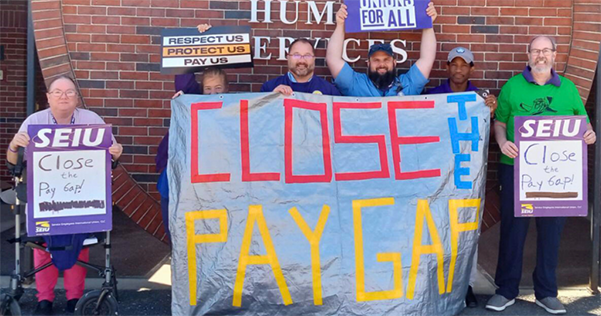Bargaining News
|February 7, 2024
State employee pay gap continues to persist and could be worsening, nonpartisan policy and research group says

Wages for Maine State Government workers continue to lag behind the earnings of their public and private sector counterparts throughout Maine and New England even after factoring in recent wage increases, according to a new analysis by the nonpartisan Maine Center for Economic Policy.
With over 2,100 jobs in state government vacant, a vacancy rate of 16%, “Maine will not be able to deliver the quality services its residents rely on if it can’t close this pay gap and hire and retain a sufficient number of employees,” wrote James Myall, economic policy analyst for the Maine Center for Economic Policy, in an analysis titled “Maine state employees still face significant pay gap,” released February 6.
“The (Mills) administration argues state employees have received wage and salary increases in contract negotiations over the last few years, which is true. These increases will amount to a 24 percent increase in wages by July 2024 compared to January 2019. However, the key context is private sector wages have increased even more than this over the same period,” Myall wrote. “For example, the average weekly earnings of private sector wage and salary workers in Maine increased by 30 percent between the first quarter of 2019 and the same period in 2023, according to data from the Maine Department of Labor. Based on projections from the Maine Economic Forecasting Commission, that increase will be 35 percent by 2024.”
Continuing, Myall wrote, “This comparison holds true when examining industries which are roughly equivalent to state government work. As would be expected in the strong labor market we have seen since coming out of the pandemic, employees in the professional and business services sector will see a 41 percent increase by 2024; administrative support employees, 47 percent; and health care and social assistance workers, 27 percent. Each of these outstrips the 24 percent negotiated increase through 2024 for state workers.”
The Maine Service Employees Association, Local 1989 of the Service Employees International Union (MSEA-SEIU Local 1989), a labor union representing over 9,000 state workers, pointed to the Maine Center for Economic Policy’s analysis in calling on the Maine Legislature to pass and fund emergency legislation known as LD 2121, An Act to Address Chronic Understaffing of State Government Positions, sponsored by Representative Drew Gattine. The legislation would fund the implementation of a new compensation and classification system for state workers. A hearing on LD 2121 is at 1:30pm Thursday, February 8, in Cross Office Building 214.
In explaining why it’s necessary to pass and fund LD 2121, MSEA-SEIU Executive Director Alec Maybarduk called out the Mills administration for its report released on January 31, which states “it is time to set aside the phrase ‘pay gap.’” Maybarduk also criticized the administration’s unwillingness to complete the 2020 classification and compensation study and negotiate over its implementation. Negotiations over that study and its implementation are required by both the state budget and contract.
“It appears that the administration defied the legislative mandate to recalculate the 2020 market salary report using current salary data, opting to cherry pick their data to create a soundbite narrative for a press release,” Maybarduk said. “However, they stopped their comparison with other State governments in 2022, they conveniently did not compare state worker wage growth to local government wage growth in Maine, and they fail to compare state workers to the private sector wage growth in Maine, which are the groups Maine state government is most directly competing with for workers.”
Continuing, Maybarduk said, “Publicly available data shows that average wage growth in Maine has been 30% from 2019 through the first quarter of 2023, according to quarterly census reports on wages –meaning that the pay gap continues to grow. In fact, according to their own data, the administration’s report released on January 31 shows that Maine State Government per-job wages grew 19% from 2019 to 2022, whereas the total growth in all sectors in Maine was 23.3%. The State’s own cherry-picked data contradicts the report’s purported findings. Sadly, this appears to be an attempt to kick the can down the road again, and not deal with the serious recruitment and retention issues in state government that are eroding the services the people of Maine rely upon.”
ABOUT LD 2121, AN ACT TO ADDRESS CHRONIC UNDERSTAFFING OF STATE GOVERNMENT POSITIONS
LD 2121 would provide $165 million in funding for a new compensation and classification system that closes the state employee pay gap for Executive Branch workers. The new compensation and classification system to be funded by LD 2121 would address the fact that two state-commissioned studies, one in 2020 and the other in 2009, show that state workers are underpaid by 15%, on average, compared to their public and private sector counterparts throughout Maine and New England. LD 2121 also would: LD 2121 also would:
- Require the administration to report annually to the Maine Legislature on all Executive Branch job vacancies, so that the Legislature can adequately assess the ongoing staffing crisis;
- Improve laws relating to recruitment and retention adjustments, making it easier to establish recruitment and retention programs targeting agencies experiencing chronic understaffing;
- Require the Maine Department of Administrative and Financial Services and the Bureau of Human Resources to develop a plan to improve the state government hiring process.